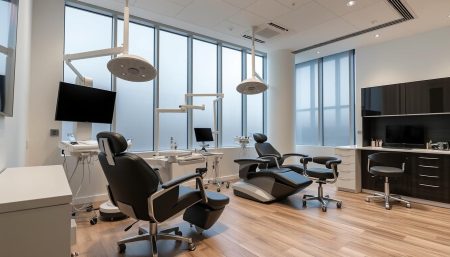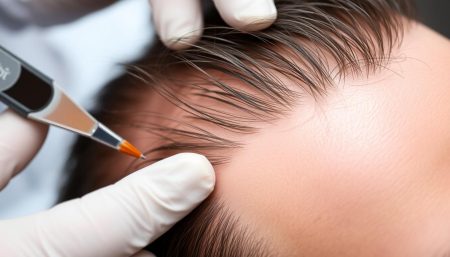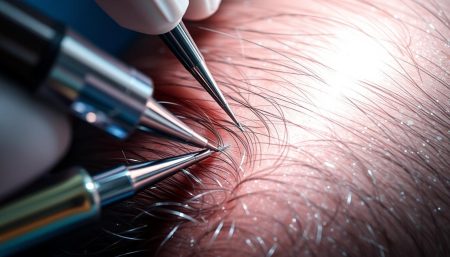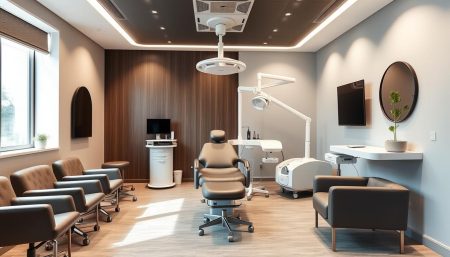Hair loss is a big worry for many in the U.S. It can make people feel less confident. While genetics and the environment are often blamed, not enough attention is given to nutrient deficiencies. These deficiencies can quietly harm hair health.
This article will focus on the vitamins needed for healthy hair. It will also show how lacking these nutrients can cause hair loss.
It’s important to understand how diet affects hair health. Knowing which nutrients are missing can help fix hair problems. We’ll look at how vitamins and minerals can prevent hair loss. This will help you take a holistic approach to hair care, focusing on nutrition.
This journey aims to educate you and offer ways to stop hair thinning. Knowing about nutrient deficiencies can help you grow strong, healthy hair.
Key Takeaways
- Recognizing vitamin deficiency as a significant factor in hair loss causes.
- Assessing the importance of vital nutrients for sustaining healthy hair.
- Addressing nutrient deficiencies to prevent and reverse hair thinning.
- Understanding the relationship between diet and hair health for better care.
- Adopting a nutrition-centric approach to improving hair vitality and strength.
Understanding the Link between Nutrients and Hair Health
The growth of hair is a complex process. It involves a cycle of growth, transition, and rest. Essential nutrients are key in this cycle. They help new hair grow and keep the scalp and follicles healthy. These nutrients greatly affect hair strength and its life cycle.
For a healthy scalp and strong hair, certain nutrients are crucial. They help strengthen hair follicles and improve scalp health. They also make the hair growth cycle more efficient.
- Vitamin A: Essential for all cells, it helps in the production of healthy sebum in the scalp.
- Vitamin C: Important for building collagen and helping in the absorption of iron, a key nutrient for hair growth.
- Vitamin E: Helps protect the scalp against oxidative stress, which is crucial in maintaining hair health in the anagen phase.
- Zinc: Supports hair tissue growth and repair and keeps the oil glands around the follicles working properly.
Knowing how nutrients affect hair health is important. It helps us understand why hair loss happens. It also shows how we can prevent it with the right nutrition and care.
| Nutrient | Role in Hair Health | Sources |
|---|---|---|
| Vitamin A | Sebum production to moisturize the scalp and keep hair healthy | Carrots, Spinach, Sweet Potatoes |
| Vitamin C | Collagen production and antioxidant protection | Oranges, Strawberries, Bell Peppers |
| Vitamin E | Supports a healthy scalp by reducing oxidative stress | Almonds, Sunflower Seeds, Spinach |
| Zinc | Essential for hair tissue growth and repair | Beef, Pumpkin Seeds, Lentils |
Which Vitamin Deficiency Causes Hair Loss
It’s important to know which vitamin deficiencies cause hair loss. Biotin, iron, and vitamin D are key vitamins linked to hair health. Understanding their roles helps in finding the right treatments and prevention.
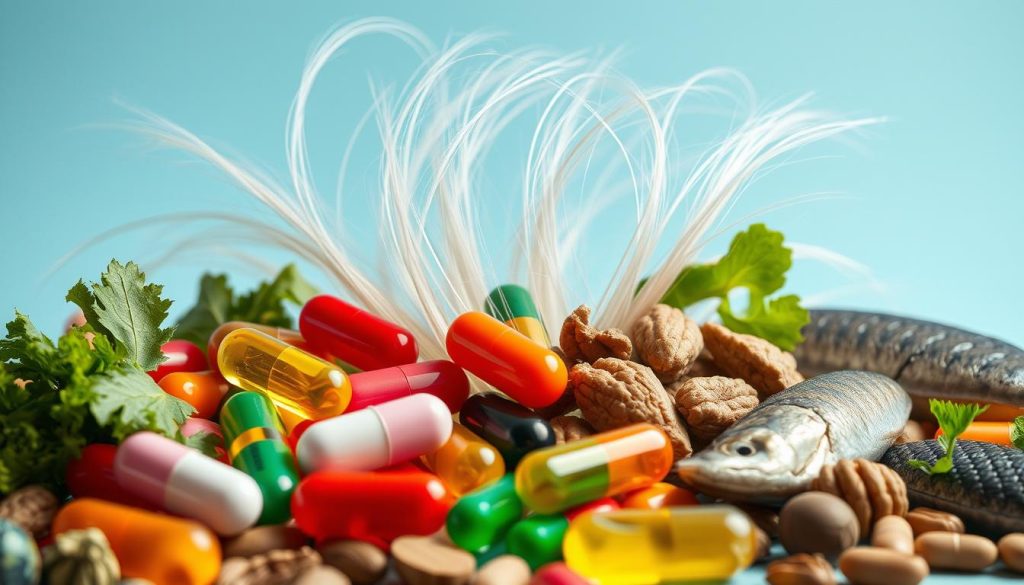
The Role of Biotin in Hair Growth
Biotin, or vitamin B7, is key for making keratin. Keratin is a protein in hair, nails, and skin. Without enough biotin, hair can thin and fall out. Taking biotin supplements or eating biotin-rich foods can help strengthen hair.
Iron’s Importance for Healthy Hair Follicles
Iron helps carry oxygen to hair follicle cells, which is vital for hair growth. Iron deficiency can lead to anemia, causing hair follicles to lack oxygen. This results in more hair shedding and slower growth. Eating iron-rich foods like spinach and red meat can help prevent this.
The Impact of Vitamin D on the Hair Growth Cycle
Vitamin D helps stimulate new hair growth. Without enough vitamin D, hair growth can slow or stop. Getting sunlight and eating foods like fatty fish can boost vitamin D levels.
Recognizing Hair Loss due to Nutritional Deficiencies
Knowing the hair loss symptoms from nutritional deficits is key. Signs like excessive hair shedding and thinning patches are common. Learning about the symptoms of different vitamin deficiencies helps identify the problem.
Common signs include thinning hair, brittle hair, and more hair falling out. It’s important to tell the difference between hair loss from diet and other causes. A professional diagnosis is usually needed.
- Thinning Hair: Hair gets thinner over time, often unnoticed until it’s quite thin.
- Brittle Hair: Hair breaks easily, possibly due to a lack of biotin or protein.
- Excessive Hair Shedding: Finding more hair on your pillow, in the shower, or on your hairbrush.
Figuring out how diet affects hair health involves several steps. These include keeping a food diary, blood tests, and checking for scalp or skin problems. If you notice ongoing hair loss, see a doctor to rule out other causes.
| Nutrient | Deficiency Symptom | Potential Hair Loss Link |
|---|---|---|
| Iron | Excessive fatigue, paleness | Directly linked to hair follicle health |
| Vitamin D | Bone pain, muscle weakness | Contributes to the hair growth cycle |
| Biotin | Skin rashes, brittle nails | Important for hair strength and texture |
Spotting and treating hair loss from nutritional deficits is crucial. With the right diet and supplements, hair health can improve. This boosts overall well-being and confidence.
Biotin Deficiency: A Closer Look
Biotin deficiency is rare but can harm hair health. It leads to hair thinning and requires special hair loss prevention. This B-vitamin is key for hair strength and texture.
Signs and Symptoms of Biotin Deficiency
Spotting biotin deficiency early is vital for hair health. Symptoms include hair thinning, brittle strands, and severe hair loss. To fight these, add biotin-rich foods to your diet.
Sources of Biotin for Hair Growth
Boosting biotin naturally improves scalp health and hair quality. Here are foods rich in biotin:
- Eggs, especially egg yolks
- Nuts and seeds like almonds and sunflower seeds
- Legumes such as soybeans and peanuts
- Whole grains and cereals
- Mushrooms
- Cauliflower
- Dairy products like milk and cheese
Eating these foods regularly can prevent biotin deficiency and promote hair growth. For more on biotin and nutrition, check out this health resource.
| Food | Biotin Content |
|---|---|
| Egg yolk | 10 mcg per egg |
| Almonds | 1.5 mcg per quarter cup |
| Sunflower seeds | 2.6 mcg per quarter cup |
| Peanuts | 5.2 mcg per quarter cup |
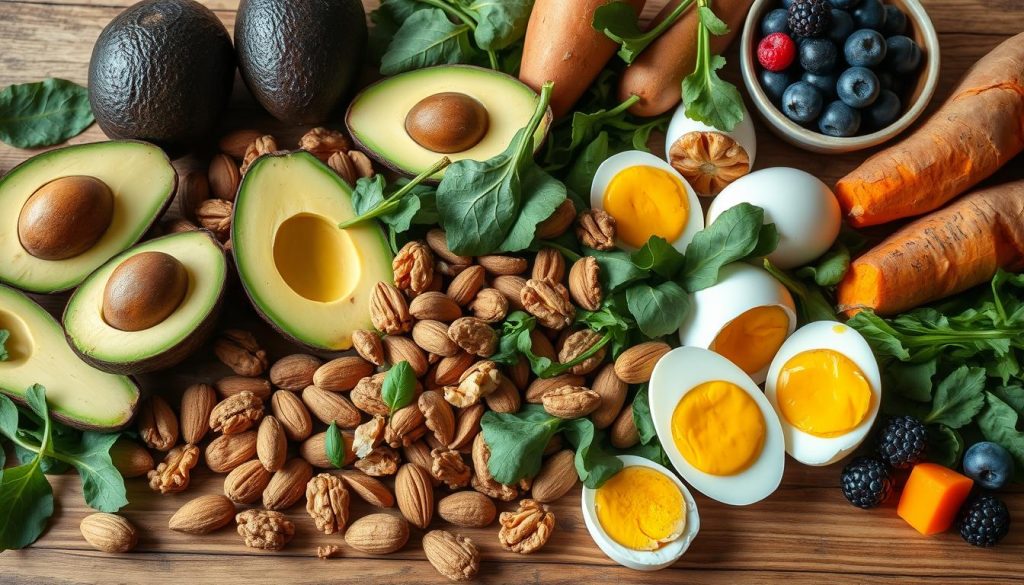
The Critical Role of Iron in Preventing Hair Loss
Keeping ferritin levels up is key for hair health, especially for women. Iron-rich foods and supplements are vital in any hair loss treatment. They help fight thinning and shedding.
Iron helps make hair cell protein. Without it, hair loss can increase. Eating iron can help hair grow and repair. Here are some iron-rich foods for healthy ferritin levels and hair:
- Spinach
- Lentils
- Red meat
- Pumpkin seeds
- Quinoa
Eating these foods daily boosts iron in the body. This supports follicle health and cuts down hair fall.
| Food Item | Iron Content (per 100g) | Benefit for Hair |
|---|---|---|
| Spinach | 2.7 mg | Helps in keratin production |
| Lentils | 3.3 mg | Supports scalp and follicle strength |
| Pumpkin Seeds | 3.3 mg | Rich in zinc and promotes hair growth |
| Quinoa | 1.5 mg | Contains proteins that fortify hair growth |
| Red Meat | 2.6 mg | Improves nutrient supply to hair roots |
Boosting ferritin levels with iron-rich foods is a smart move in hair loss treatment. It’s not just about replacing lost hair. It’s about nourishing the body to prevent future loss.
Vitamin D Deficiency and Its Impact on Hair
Vitamin D plays a key role in keeping hair follicle health in check. It’s mainly gotten through sunlight exposure. When Vitamin D hits the vitamin D receptor on hair follicles, it helps the hair growth cycle. Without enough Vitamin D, this cycle can get disrupted, causing hair to thin and fall out.

To boost Vitamin D levels, balance sunlight exposure with diet and supplements. It’s important to enjoy the sun safely to get Vitamin D without risking skin cancer. Eating foods rich in Vitamin D, like salmon, fortified milk, and egg yolks, also helps keep levels up.
Here’s how natural Vitamin D sources affect hair health:
- Fatty fish like salmon and mackerel are full of Vitamin D and omega-3s, which are good for hair.
- Fortified foods, like some cereals and dairy, are easy ways to get more Vitamin D.
- Short periods of sunlight can help make Vitamin D, preventing common deficiencies.
| Source | Vitamin D Content | Benefits for Hair Follicle Health |
|---|---|---|
| Salmon | 570 IU per 3 oz | Supports hair growth cycle activation |
| Fortified Milk | 120 IU per cup | Assists in keratin production |
| Sunlight | Varies | Stimulates vitamin D receptors in hair follicles |
Keeping Vitamin D levels up is key for hair follicle health and fighting hair loss. It shows how vitamin D receptor activation is vital for hair growth. It also highlights the need to be mindful of sunlight exposure and what we eat.
Protein Malnutrition: An Overlooked Factor in Hair Health
When we talk about hair health, we must think about protein malnutrition. This condition affects keratin production, which is key for strong hair. Protein is more than just for muscles; it’s vital for hair strength and scalp health.
Understanding Hair’s Protein Needs
Hair is mostly keratin, a protein that needs enough dietary protein to grow well. If the body lacks protein, keratin production drops. This can cause weak, brittle hair or even hair loss. Eating enough protein-rich foods is key to keeping hair healthy and strong.
Combatting Protein Deficiency for Hair Regrowth
Fixing protein malnutrition helps hair grow back stronger. Eating foods high in protein like lean meats, fish, legumes, and nuts helps. For those who can’t eat meat or have special diets, talking to a nutritionist is a good idea. They can help make a diet that’s good for hair without breaking any rules.
| Source | Protein Content | Benefits for Hair |
|---|---|---|
| Chicken breast | 31g per 100g | High in protein for keratin production |
| Lentils | 9g per 100g | Rich in protein and essential nutrients for hair growth |
| Almonds | 21g per 100g | Provides protein and healthy fats for hair strengthening |
Improving your diet helps fight protein malnutrition and boosts keratin production. This is crucial for hair strength and health. Eating protein regularly is good for your hair and your whole body.
Zinc Deficiency and Hair Regrowth Challenges
Zinc is key for hair growth and overall health. It helps with cell division, protein making, and boosting the immune system. This is why having enough zinc is important for fighting hair loss and helping hair grow back.
Critical Functions of Zinc in Hair Tissue Growth
Zinc is essential for fixing and growing hair tissue. It helps by protecting the scalp from harm. Zinc also aids in making proteins and dividing cells, which are crucial for hair and scalp health.
Identifying and Fixing Zinc Deficiency
Zinc deficiency can cause thinning hair, slow growth, and bald spots. Spotting this early is crucial for treatment. Taking zinc supplements can help reverse hair loss and boost the immune system.
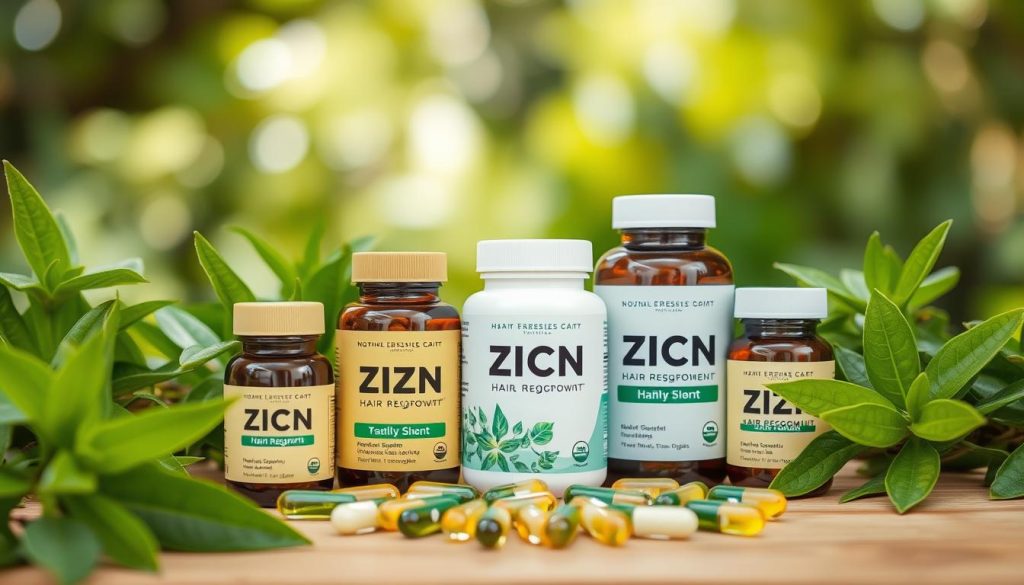
Fixing zinc deficiency helps hair grow back and boosts the immune system. This shows zinc’s benefits for health and hair care. Here’s a look at food sources versus zinc supplements:
| Source | Zinc Content | Benefits |
|---|---|---|
| Oysters | 76 mg per 100g | Highly concentrated source |
| Beef | 12.3 mg per 100g | Supports muscle growth alongside hair health |
| Pumpkin Seeds | 7.81 mg per 100g | Plant-based and rich in other minerals |
| Zinc Supplements | Varies by product | Consistent and controlled dosage |
Getting enough zinc, through food or supplements, is important. It helps not just with hair loss but also strengthens the immune system. Zinc’s benefits are wide-ranging.
Shedding Light on Telogen Effluvium
Understanding Telogen Effluvium, a common cause of hair loss, is key. It often happens after big life changes or when we don’t eat well. Knowing how these factors affect us can help us get our hair cycle back on track.
How Nutrient Deficiencies Trigger Telogen Effluvium
When we don’t get the right nutrients, our hair growth can get out of balance. This can push too many hair follicles into a resting phase. Not having enough of the right foods can harm our hair’s growth cycle.
Reversing Telogen Effluvium Through Nutrition
To fix Telogen Effluvium, we need to eat well. Foods rich in proteins, iron, zinc, and B-vitamins are important. They help our hair grow and reduce shedding. Eating these foods can help fight hair loss caused by stress.
| Nutrient | Role in Hair Health | Sources |
|---|---|---|
| Protein | Builds hair fibers | Chicken, eggs, legumes |
| Iron | Supports hair follicle growth | Red meat, spinach, lentils |
| Zinc | Maintains oil glands around follicles | Oysters, beef, pumpkin seeds |
| B-Vitamins | Improves blood flow to the scalp, promotes hair growth | Whole grains, avocados, nuts |
Alopecia Areata: Nutrient Deficiencies and Autoimmune Responses
Alopecia areata is an autoimmune condition where the immune system attacks hair follicles. This leads to autoimmune hair loss. Research shows a link between this condition and nutrient deficiencies. It highlights the importance of nutrition and immunity in fighting autoimmune diseases.
Nutrient deficiencies can weaken the immune system. This can make autoimmune responses worse. Eating a diet rich in nutrients might strengthen immunity. It could also reduce the severity of alopecia areata flare-ups.
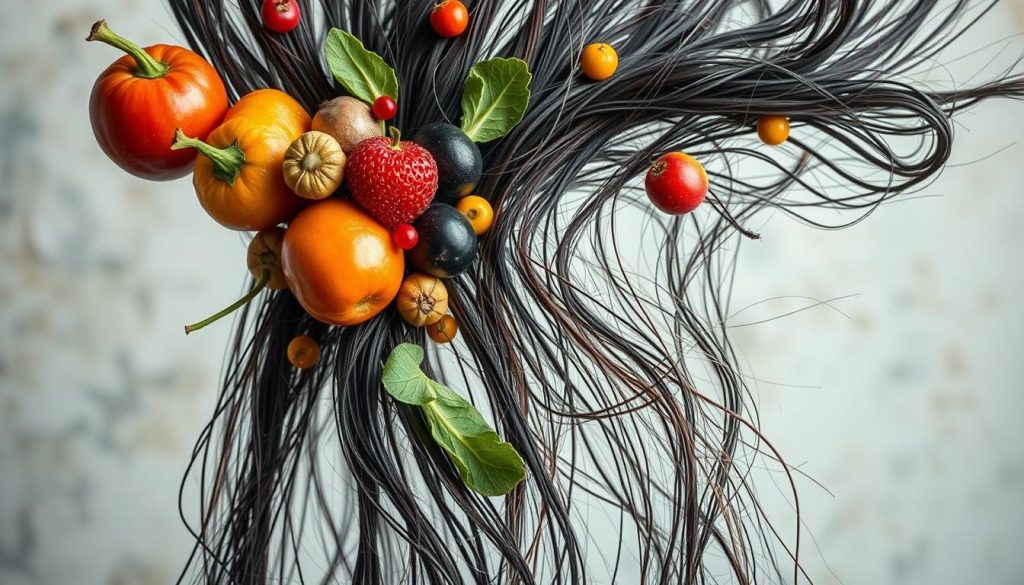
- Omega-3 Fatty Acids – Known to reduce inflammation, potentially dampening autoimmune responses
- Zinc – Vital for immune function and has been shown to support hair growth
- Vitamin D – Often deficient in individuals with autoimmune diseases, and supplementation may help modulate immune responses
A table of beneficial nutrients can help individuals tailor their diets. It supports their immune system while managing autoimmune hair loss.
| Nutrient | Benefits | Sources |
|---|---|---|
| Omega-3 Fatty Acids | Reduces inflammation | Salmon, Flaxseeds, Walnuts |
| Zinc | Supports immune function and hair growth | Pumpkin seeds, Legumes, Meat |
| Vitamin D | Modulates immune responses | Sunlight, Fortified foods, Egg yolks |
Adding these nutrients to daily meals is crucial. It helps manage autoimmune hair loss and boosts body immunity. This can ease alopecia areata symptoms.
Designing a Diet to Combat Hair Loss from Nutrient Deficiency
To fight hair loss from nutrient lack, focus on a balanced diet rich in hair nurturing nutrients. A well-planned diet can boost your hair care routine. It helps grow healthier, thicker hair.
Must-Have Vitamins and Minerals for Healthy Hair
To grow strong hair, add key vitamins and minerals to your diet. These are crucial for hair health:
- Biotin (Vitamin B7): Key for hair growth and scalp health.
- Iron: Keeps hair from falling out by improving scalp blood flow.
- Zinc: Important for hair growth and repair.
- Vitamin D: Boosts new hair follicles and hair growth.
Foods to Include in Your Hair Care Diet
Eat foods that help your hair stay healthy. Add these to your meals:
- Spinach: Full of iron and folate, it keeps hair follicles healthy.
- Citrus Fruits: High in Vitamin C, great for collagen and iron absorption.
- Nuts and Seeds: Rich in biotin, omega-3s, and Vitamin E, all good for hair.
- Fatty Fish: Salmon and mackerel are full of omega-3s, vital for hair growth.
- Eggs: Good source of amino acids and biotin, important for strong hair.
Eating these foods helps fight nutritional deficiencies and strengthens your hair care routine. A balanced diet is your best defense against hair loss. It keeps your scalp healthy and your hair strong.
Dietary Supplements: Aid in Addressing Deficiencies
Dietary supplements are key in fighting hair loss. They help ensure our bodies get all the nutrients we need. It’s important to find the right supplements to support hair growth and health.
Evaluating the Need for Supplements
Knowing when to use supplements is vital. Start by checking your diet and finding missing nutrients. Signs like thinning hair or slow growth might mean you need supplements.
Choosing the Right Hair Growth Supplements
Choosing the right supplements is crucial. Look for products that are safe and backed by science. Avoid those with too many fillers or additives.
- Biotin: Known for boosting hair growth, it helps hair follicles.
- Vitamin D: It helps new and old hair follicles grow.
- Iron: It’s key for healthy hair growth by improving oxygen transport.
Talking to a healthcare provider can help pick the right supplements for you.
When to Consult a Healthcare Professional
Knowing when to get professional help is key to managing hair loss well. If you’re losing a lot of hair, getting a medical assessment is a good idea. Hair loss can be caused by many things, not just lack of nutrients. Hormones, genetics, and other health issues can also play a part.
Deciphering Hair Loss Causes Beyond Deficiencies
Finding out why you’re losing hair needs a pro’s touch. An expert treatment provider can create a plan just for you. A doctor’s check-up can also spot other health problems that might be causing your hair loss.
Getting Professional Advice on Supplementation
Always talk to a doctor before taking supplements. A dietitian consultation can make sure you’re getting the right supplements. They can also give you diet tips to help your hair grow back and improve your health.
For more info on vitamins and hair health, check out which vitamin deficiency causes hair loss. It’s full of tips on how to keep your hair healthy through nutrition.
| Service | Description | Benefits |
|---|---|---|
| Medical Assessment | Evaluation by healthcare professionals to identify the cause of hair loss. | Accurate diagnosis, personalized treatment plans. |
| Expert Treatment | Advanced treatment options provided by specialists. | Targeted, effective solutions for hair regrowth. |
| Dietitian Consultation | Professional advice on nutrition for hair health. | Guidance on dietary changes and supplementation. |
Conclusion
Starting a healthy hair journey means listening to your body’s signals, especially about hair health. We’ve looked at how nutrients like biotin, iron, vitamin D, and protein are key for hair health. Not getting enough of these can lead to hair loss, showing why a proactive hair care plan is important.
We’ve also talked about different hair loss types, like telogen effluvium and alopecia areata. The main thing is to fix nutritional gaps. Eating well and using supplements can help your scalp and hair more than just products.
But, not all hair loss can be fixed at home. That’s when seeing a doctor is crucial. They can give you advice and a treatment plan that fits you. Whether you’re just noticing thinning or have more hair loss, making smart choices about hair care can really help. Take charge of your hair care and let nutrition help you get strong, healthy hair.
FAQ
Does vitamin deficiency cause hair loss?
Yes, some vitamin deficiencies can cause hair loss. Biotin, iron, vitamin D, and zinc are key nutrients. Their lack can disrupt hair growth and lead to hair loss conditions.
What vitamins are essential for healthy hair growth?
Vitamins and minerals like biotin, iron, vitamin D, and zinc are vital. They support the hair growth cycle and keep hair follicles strong.
How can I tell if my hair loss is due to a vitamin deficiency?
Signs like excessive hair thinning and brittle hair may point to nutrient deficiencies. But, getting a professional diagnosis is key to find the exact cause.
Which foods are rich in biotin for preventing hair loss?
Foods rich in biotin include eggs, nuts, seeds, and avocado. Salmon, sweet potatoes, and dairy products are also good sources. Adding these to your diet can help prevent hair loss.
Why is iron important for preventing hair loss?
Iron helps make hemoglobin, which carries oxygen to hair follicles. Having enough iron supports healthy hair growth and prevents loss.
Can increasing vitamin D intake improve my hair health?
Yes, vitamin D stimulates new and old hair follicles. Getting more vitamin D through sun, food, or supplements can improve hair health.
How does protein malnutrition affect hair strength and growth?
Hair is mostly keratin, a protein. Not enough protein weakens hair, leading to thinning and loss. Eating enough protein is key for hair health.
What are the symptoms of zinc deficiency related to hair health?
Zinc deficiency can cause hair loss, slow growth, and weak strands. Zinc is important for cell division and protein synthesis in hair.
Can nutrient deficiencies trigger Telogen Effluvium?
Yes, big changes in diet or severe nutrient lack can cause Telogen Effluvium. It’s a hair loss condition due to stress.
Is Alopecia Areata related to nutrient deficiencies?
Alopecia Areata is an autoimmune issue. But, nutrient deficiencies might affect its severity. A balanced diet may help manage it.
How can I design a diet to combat hair loss from nutrient deficiency?
Eat foods rich in biotin, iron, vitamin D, zinc, and protein. Include leafy greens, nuts, seeds, lean meats, and whole grains in your diet.
When should I consider taking dietary supplements for hair growth?
Take supplements if your diet lacks key nutrients for hair growth. Talk to a healthcare professional to find the right supplements for you.
How do I know when to consult a healthcare professional about my hair loss?
If you’re losing hair without reason, see a healthcare professional. They can find the cause and suggest treatments or dietary changes.












